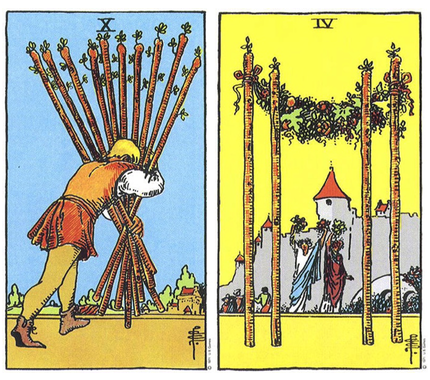Today is twelve days, which are one week and five days of the Omer. Hod of Gevurah: The Eight and Five of Wands.
/
Surrender in Discipline.
The Eight and Five of Wands make an interesting pair. The Five of Wands is one of the most crowded cards in the deck, with five people contending with each other. And the Eight of Wands is one of the few cards with no people in it at all.
In the Five of Wands, the Gevurah card, we see a group of people who all want their own way. Sometimes I see this card as a projected image of my own mind—filled with contradictory impulses all wanting to take control of my next action at any given moment. Anyone who has watched their mind in meditation will recognize this dynamic. But there’s another dynamic in meditation as well—because underneath these arguing impulses is a greater silence.
When you fight with the mind to try to train it, you only multiply and give strength to these impulses. When you surrender control and only observe, in time—sometimes quickly, sometimes after long practice—these impulses give way, these conflicting thoughts quiet down. And you experience a one-pointed concentration.
The Eight of Wands, the card that corresponds to Hod, which includes Surrender in its constellation of meanings, shows this one-pointed concentration.
When you first sit down to meditate this very action kicks up all the protests of the characters you see in the Five of Wands. But as you merely watch without engaging, the energy that was going into inner conflict now unites—just as you see the eight staves all headed in the same direction in the other card.
This 49-day ritual is another discipline. And it will kick up all kinds of inner stuff that your mind will use to distract you or get you to stop examining your mind and its reactions. All of a sudden, despite the fact that you may be home all day in COVID isolation, you’ll hear yourself saying “I’m just too busy to count the Omer today.” That’s just a thought though. It’s not reality. Let go of the thoughts and surrender to this practice. Watch what happens within. Because Hod is also about Humility and Surrendering the Ego, don’t identify with any of the thoughts. Just let them come and go like clouds across the expanse of the clear mind.
Another note with regard to Humility on this day, since Gevurah is also Judgment. I’m a judgmental kind of guy. And part of what I have to look at on this day is how I can bring an attitude of humility to my judging mind, so that I am not seeing myself as better than someone else. Like “oh, look at me, I’m a great meditator!” Hah.
Of course, some days are easier and some days are harder. Easy or hard though is a judgment. And that’s also something to let go of in this week of Gevurah and Judgment.
How is your surrender to this discipline going?





